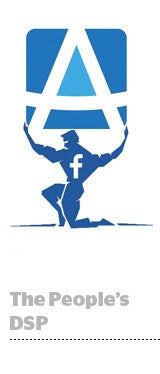 Facebook is taking the next logical step in its evolution toward a full-stack ad tech offering, rolling out a demand-side platform (DSP) capable of executing programmatic buys using the company’s “people-based” advertising methodology.
Facebook is taking the next logical step in its evolution toward a full-stack ad tech offering, rolling out a demand-side platform (DSP) capable of executing programmatic buys using the company’s “people-based” advertising methodology.
In recent weeks Facebook’s Atlas team has pitched the DSP product to agency partners, including Omnicom Group, Havas, Merkle and others, according to multiple sources. Facebook has a list of target advertisers it is asking to commit upwards of $200,000 to test the nascent offering.
“It’s not perfect in market or ready for production yet,” said one source. “It needs to be tested at scale with a bunch of different clients.”
Slated for release in the first half of 2016, the DSP will add a fourth pillar to Facebook’s ad platform business, which today includes an ad server (Atlas), sell-side platform (LiveRail) and ad network (Audience Network). In briefing agencies, Facebook is billing the tool as a next generation DSP with stronger identity management than anything in market today. That includes its chief rival, Google’s DoubleClick Bid Manager.
Facebook declined to comment for this story.
“The functional draw is the push of the Facebook data set into an addressable targeted display program through Atlas,” said another source briefed on the product. “The more I can address a message to an individual in more places on the web, the more I’m going to be willing to pay for that.”
The feature set, beyond the activation of Facebook’s powerful cross-device audience data, is still a little murky. Support for mobile app and video inventory are presumably strong points, given Facebook’s mobile chops and LiveRail’s origins as a video platform. But other capabilities are still being sorted out, including integration of third-party data sources.
A Needed Boost For Atlas
A Facebook DSP has looked likely since the relaunch of Atlas one year ago, an event that had some of the futuristic appeal of Elon Musk’s recent reveal of the new Tesla Model X – but on a far dorkier level.
Judging only by its advanced feature set, Atlas seemed well positioned to upend the ad server category, but its debut has not been as triumphant as the company might have hoped. Facebook has declined to provide a tally of agencies and marketers using it, and very few customers have been identified by name.
One recently published case study demonstrates Atlas’s conundrum and its opportunity.
Estee Lauder cosmetic brand MAC used Atlas’ people-based marketing features to discover that its online conversions were 16% higher than its previous cookie-based measurement had led it to think.
“That’s actually huge,” said Yann Gabay, who runs the France and southern Europe region for MAC digital agency NetBooster.
Gabay said Atlas also helped MAC discern that cookie-based measurement had overstated the campaign’s reach against its two target audiences: women aged 18 to 24 and women aged 25 to 44.
And yet, despite the positive results, Gabay confessed some surprise that MAC’s campaign had been published by Facebook.
“We used 10 to 15% of the capabilities of the tool,” he told AdExchanger. “We didn’t use the targeting option for Atlas, and we served the same banners to all users.”
He concluded, “It’s like using a Rolls Royce to go buy bread.”
This naturally begs the question: Why has Facebook been unable to cough up adoption numbers for Atlas? Are customers reluctant to go public, or do they just not exist?
MAC’s experience is revealing here. Gabay said NetBooster – which invests 80% of its media programmatically – uses Atlas primarily for direct buys and double-serves all Atlas campaigns with its preferred DSP, DoubleClick Bid Manager.
“The moment Atlas launches a DSP, that’s a new question,” Gabay said.
(It’s important to note that the interview with Gabay happened before Facebook’s DSP plans were shared with AdExchanger.)
Whither DoubleClick?
In the year since Atlas’s relaunch, Google has become alert to the “people-based” threat posed by its challenger. A few months ago Google began supporting cross-device measurement in its DoubleClick Marketing Suite, using a combination of logged-in user data and so-called probabilistic approaches, which use device attributes to link users to their various screens.
And last week DoubleClick embraced first-party data matching, which has long been on offer through Facebook’s Custom Audiences program and which has Google has weirdly avoided until now.
In light of these aggressive countermeasures by Google, the bar may be quite high for Facebook to one-up its larger rival, as well as other scaled DSP solutions in the marketplace like MediaMath and Turn.
As one source put it to AdExchager, “It can’t be a ‘me too’ solution. It has to be a little bit more evolved.”












